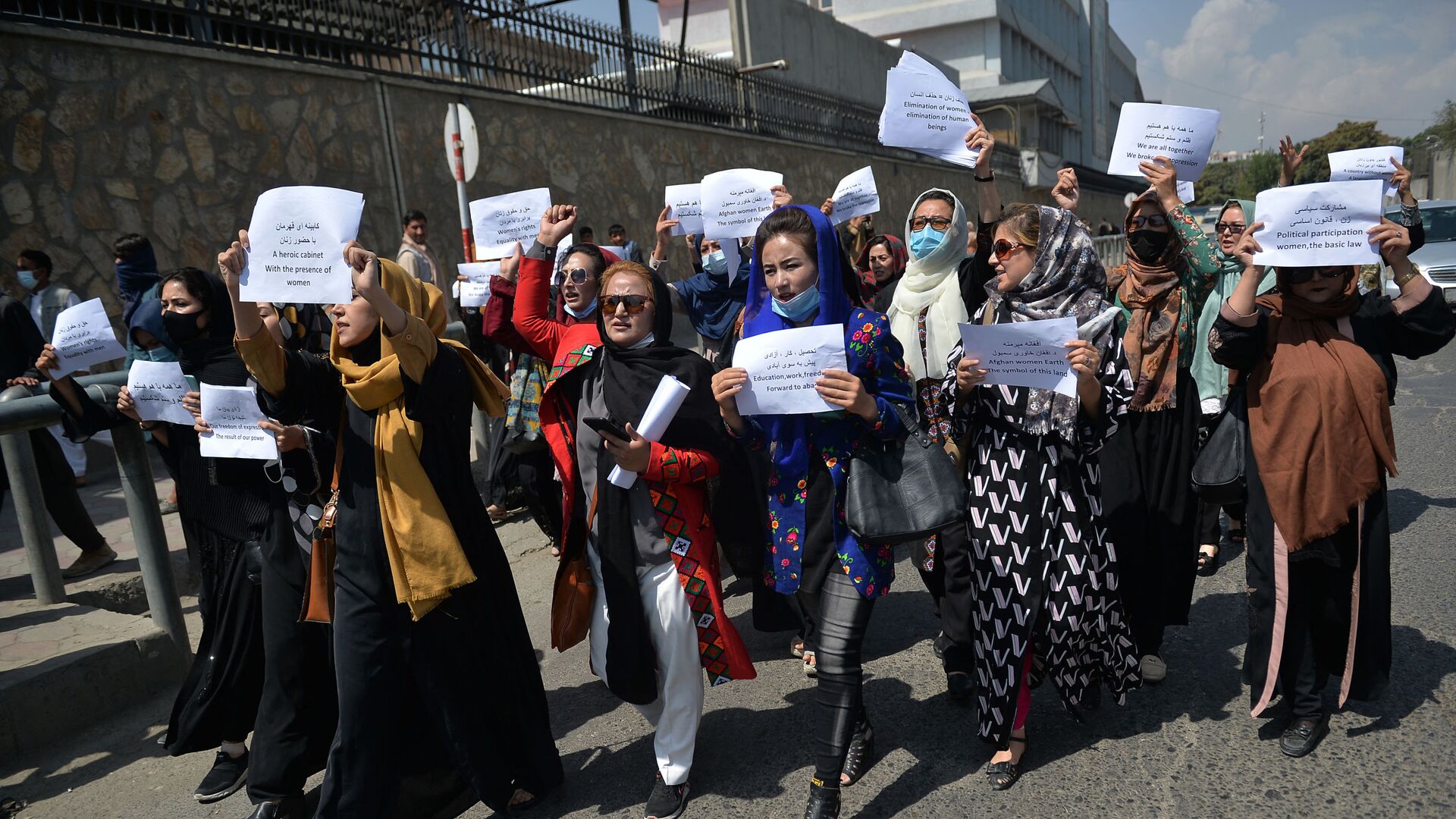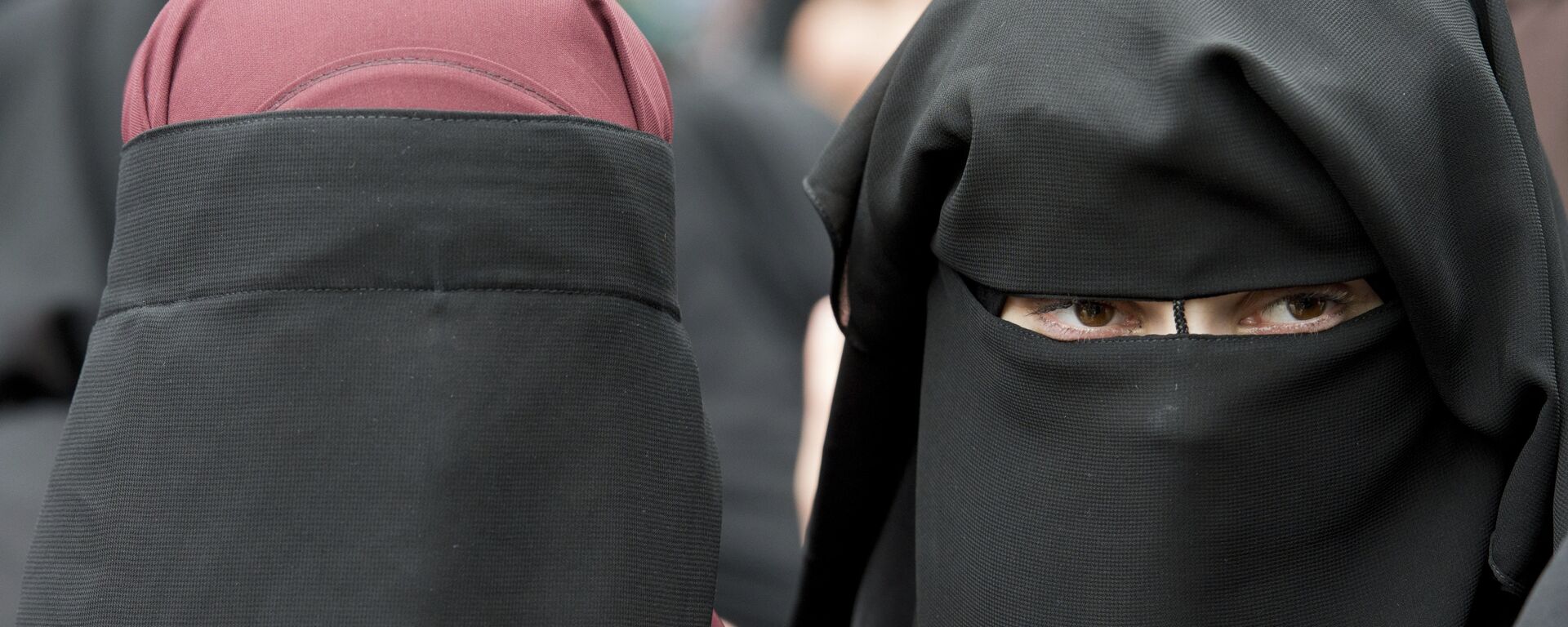Afghan Women One Year Under Taliban: No School Above 6th Grade, Forced Early Marriages

© AFP 2023 / HOSHANG HASHIMI
Subscribe
MOSCOW (Sputnik) Tommy Yang - Afghan women had to face a serious degradation in their rights over the year since the Taliban* (under UN sanctions for terrorist activities) took power in Afghanistan, including the revival of forced marriages and bans on education, a gender issues advocate shared with Sputnik.
When the Taliban took over Afghanistan in August last year, Frozan’s daughters faced the exact fate she herself experienced as a teenage girl about 20 years ago. Under the Taliban’s rule in Afghanistan in 1996, Frozan, who was 13 years old at the time, could no longer go to school. Fortunately, her mother, who was a school teacher, decided to continue to teach her at home.
Naturally, Frozan followed in her mother’s footsteps and started to homeschool her daughters and a number of other girls in the neighborhood last year.
However, as a human rights activist who specialized in gender issues, Frozan’s advocacy made her an easy target for the Taliban.
“Under the rule of the Taliban, I still continued my activities through some media and I was engaged in conducting some protests against the Taliban. Unfortunately, the threats against me increased,” Frozan, who preferred to be only identified by her first name, told Sputnik.
That’s when Frozan decided to try to find a way to get her family out of the country.
“Some organizations under the German government helped to protect us. They took us to Pakistan on Nov 13 and we stayed there for 17 days. Then we were able to obtain German visas in December. We arrived here in December 2021. It’s been almost nine months since our arrival in Germany,” she said.
Hopeless Without Education
Although Frozan was able to bring her teenage daughters to safety in Germany, she continued to worry about other young girls in Afghanistan whose lives were turned upside down under Taliban’s rule.
“When the Taliban took over the Afghanistan and all the rights of women were limited. It has been a year since our homeland came under the rule of the terrorist group Taliban. Many achievements were lost. Our girls were deprived from rights to education. Women were still advocating for their rights to work. Everyone was demanding freedom. But unfortunately, all the structures for protecting and monitoring women’s rights were completely destroyed,” she said.
The activist became deeply concerned for the fate of millions of women, especially young girls, in the country.
“Domestic violence has increased. Forced marriage and early marriage have also increased. People are suffering from poverty. The Taliban have been widely violating the rights of human rights activists. And some women’s rights activists were tortured by the Taliban,” Frozan said.
As Frozan was teaching her daughters at home, she also took in some teenage girls from her neighborhood to continue their studies. Under the Taliban’s rule, young girls could no longer go to school after the 6th grade. That’s what made those teenage girls extremely vulnerable.
“There were about five girls from other neighbors. As I know, one of them could find a chance to get out of the country. But unfortunately, the rest of them are still living under the rule of the Taliban and they couldn’t go to school. When I got in touch with them sometimes, they said they felt very hopeless. Some of them felt distress and even got depression. They’re afraid and they can’t sleep comfortably at night. Their situation is not good,” she said.
Early Marriage As Protection
While missing the opportunity to continue to go to school, the young teenage girls also became the target of some Taliban members.
“Based on the reports and some contacts I have with relatives in Afghanistan, people are not living under pressure and they’re afraid of the Taliban. That’s because some Taliban members tried to get in a car with the girls. Because of that, some families tried to find a chance to arrange the girls to get married to get out of the family from an early age,” Frozan said.
To avoid the young girls from being taken advantage by the Taliban, some families started to marry off the girls at an early age as a way to protect them.
“There’re some cases in some provinces. I don’t want to mention the names of the girls. The Taliban threatened the families to give the girls to them. Because there is no opportunity for the girls to continue their education, the girls can only accept that the only way [to be safe] is to get married,” Frozan said.
Nevertheless, the gender issue activist warned that such arranged marriages may not be the best way to protect the girls.
“The right to marry is one of the basic human rights. That is when a person can make the decision to get married freely without any force or pressure. When families don’t have any other ways to protect their girls, they arrange their marriage. But it’s not a good practice, because the girls could become the victims of the wrong decisions of their families,” she said.
Getting married at an early age could also bring other challenges for the young girls, the activist added.
“Early marriage means being pregnant and becoming a mother at an early age. All these things have many negative consequences on women’s health. And all the structures that were supposed to provide services, including the health sector, have decreased. Many special programs that provided services for women relied on donors. Those services became very limited and women don’t have access to quality services anymore,” Frozan said.
The activist pointed out that the quality of healthcare services in Afghanistan dropped sharply under the Taliban’s rule because many doctors have fled the country.
“Many doctors have decided to get out of the country. I know some medical specialists have left Afghanistan and they’re now only living as a refugee in their new country. One of the examples is my husband is a doctor specialized in tuberculosis management. When he and other doctors get out of the country, their absence will have a strong impact on the medical services,” she said.
Afghanistan Needs Me More
When the Taliban first took power in Afghanistan in August last year, the group pledged to respect women’s rights “within the bounds of Islamic law.”
The changes for women in Afghanistan in the past year have shown what the Taliban meant.
“Before the rule of the Taliban, women made up about 26% of civil service employees. And about 28% students in universities and 29% of school students were female. But unfortunately, in the past year, many of these working women lost their jobs and female students above 6th grade had not had the opportunity to continue their studies,” Frozan said.
The activist said she never had any hope that the Taliban would be any different from the last time they ruled the country.
“When the Taliban took over Afghanistan the first time in the 1990s, they always promised they would open the schools [for girls]. But in five years, they didn’t open the schools and they didn’t fulfill their promise. The Taliban is a terrorist group that will never change. We don’t expect the Taliban to change. They’re a terrorist group. They have their own ideas and strategies. They have always denied women from all the structures,” she said.
After her family’s arrival in Germany, Frozan’s daughters and sons were able to quickly adapt to their new life. They attended local schools in Germany and made new friends.
Frozan and her husband have both received a 3-year resident permit to stay in Germany and plan to apply for German passports.
However, as someone who spent her entire career advocating for women’s rights in Afghanistan, Frozan still believed she could maximize her value by continuing to fight for Afghan women.
“The standard of life here in Germany is very high and the good quality education is good for my children. Everything is great here. But I love my homeland. If I don’t feel any danger today, I would go back to my country at once. That’s because my community and my people need me more than here. Unfortunately, I can’t do it now,” she said.
*Organization is under UN sanctions over terrorist activities


